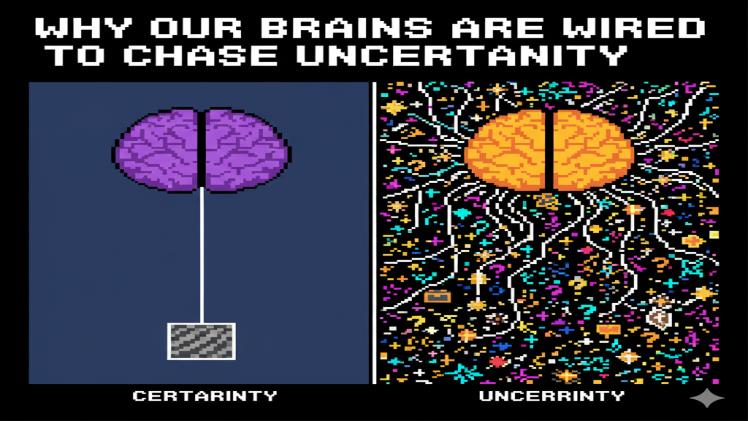Why Our Brains Are Wired to Chase Uncertainty

We are rational decision-makers, and the reality is much more exciting: our brains are designed to pursue uncertainty. Whether or not we wake up tomorrow in a moist bed or win the online casino roulette game, unpredictability triggers something primal —a mix of anticipation, excitement and, yes, dopamine. The key to this lies in the easy allure of games of chance and in how uncertainty exerts subtler influences on our daily actions.
All Daily Experiences of Uncertainty.
Between the choices we have to make daily, it is all unpredictable. Is that an email that brings joy or pressure? Will the stock market love your portfolio, or will it kill it? What seems significant are ambiguities, such as whether the coffee shop will stock your favorite, that same brain activity as games based on luck, capitalize on uncertainties—a cause of stress—and that draws you to participation. If the results are unpredictable, our brain predicts potential rewards, creating a dopamine loop that makes us check, click, or spin again. It is this mechanism that makes people become addicted to social media feeds and scroll endlessly to get that next rewarding post.
The Neuroscience of Anticipation.
The brain’s reward system is at the center of our interest in uncertainty. Two of these important areas are the striatum and the prefrontal cortex, which are involved in the processing of expected rewards and decision-making. Dopamine spikes when there is something unpredictable with a potential payoff. It is not a one-time rush; it is a reward signal that tells your brain, “Do it again — it could be worth it.”
Variable rewards are especially powerful. They create a feedback loop that is virtually impossible to ignore, unlike predictable outcomes. Consider the turning of a wheel in casino roulette online there is no certainty of the result. Such uncertainty makes the brain active and constructs behavioural patterns that are persuasive and enduring.
Psychological Motives of Risk-Seeking.
Human beings are programmed to explore the new. That novelty in spades is provided by uncertainty. It generates interest, inspires discovery, and gives a barely noticeable adrenaline rush, regardless of the lack of stakes. This is what behavioural economics refers to as the thrill of the unknown, and this is why individuals might be happy to go through uncertainty despite the absence of a big reward.
These principles are implemented in gambling settings, such as those at National Casino Hungary. The mind is engaged even with low stakes in a game just because it is unpredictable. There is an enhanced influence of cognitive biases, such as overestimating one’s chances following near-misses, which creates a strong incentive to participate more than once.
The Uncertainty of The Digital Age.
We are drawn to uncertainty much more than casinos. Digital platforms, such as social media and gaming applications, use spontaneous rewards to encourage users to blog to their fullest. Algorithms, micro-wins, and notifications are all using the same dopamine pathways as reward uncertainty.
In micro-wins, especially, they are intriguing. The small, unpredictable rewards make users repeat and support the behaviour without necessarily providing a high payoff. The principle is astonishingly similar to the mechanics of online casino roulette: small wins and surprises keep attention, which fuels long-term engagement. The use of instant gratification and behavioural loops only exacerbates this effect, as digital settings are increasingly habit-forming, as we frequently notice.
Expert Assessment
Neuroscientists and behavioural economists agree that our brains are designed to respond to unpredictability. The stimulation of the striatum by variable rewards, cognitive biases in risk perception, and dopamine loops in engagement reinforcement. Design-wise, both the online and gaming environments use mechanisms that are either morally right or wrong to maintain attention and influence behaviour.
At the micro level, the appeal of uncertainty shapes most aspects of contemporary life. Recognizing the neuropsychological and behavioural principles that underpin this attraction to risk, novelty, and unpredictability can help demystify why we are drawn to them even in our daily virtual practices. A real-life example of these habits at places like National Casino Hungary will provide the clearest physical evidence of how much our minds yearn for some uncertainty, without necessarily having to make a single bet.




